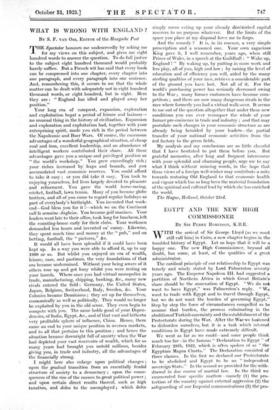T HE Spectator honours me undeservedly by asking me for my
views on this subject, and gives me eight hundred words to answer the question. To do full justice to the subject eight hundred thousand would probably barely suffice. But a French wit has said that every book can be compressed into one chapter, every chapter into one paragraph, and every paragraph into one sentence. And, remembering this, it occurs to me that the whole matter can be dealt with adequately not in eight hundred thousand words, or eight hundred, but in eight. Here they are : " England has idled and played away her position."
Your long era of conquest, expansion, exploration and exploitation begat a period of leisure and laziness— no unusual thing in the history of civilization. Expansion and exploration and exploitation had, together with your enterprising spirit, made you rich in the period between the Napoleonic and Boer Wars. Of course, the enormous advantages of a wonderful geographical situation, of cheap coal and iron, excellent leadership, and an abundance of intelligent workers contributed their share. All these advantages gave you a unique and privileged position as " the world's workshop." You grew exceedingly rich ; your riches increased by leaps and bounds, and you accumulated vast economic reserves. You could afford to take it easy ; or you did take it easy. You took to enjoying yourselves, led lives largely devoted to pleasure and refinement. You gave the world horse-racing, cricket, football, lawn tennis. Many of you became globe trotters, and all of you came to regard regular holidays as part of everybody's birthright. You invented that week- end—God bless you for it !—which we on the Continent call la semaine Anglaise. You became golf maniacs. Your leaders went late to their office, took long for luncheon, left the counting-house early for their clubs. Your workmen demanded less hours and invented ea' canny. Likewise, they spent much time and money at the " pub," and on betting, football, the " pictures," &c.
It would all have been splendid if it could have been kept up. In a way you were able to afford it, up to say 1900 or so. But whilst you enjoyed an era of wealth, leisure, ease, and pastimes, the very foundations of that era became undermined. Without your being aware of it others rose up and got busy whilst you were resting on your laurels. Where once you had virtual monopolies in trade, manufacturing, shipping, banking, &c., many new rivals entered the field : Germany, the United States, Japan, Belgium, Switzerland, Italy, Sweden, &c. Your Colonies became Dominions ; they set up for themselves, economically as well as politically. They would no longer be exploited by you in the old sense. They even begin to compete with you. The same holds good of your Depen- _ dencies, of India, Egypt, &c., and of that vast and hitherto very profitable sphere of influence, China. Hence, there came an end to your unique position in oversea markets, and to all that pertains to this position ; and hence the situation became downright full of anxiety when the War had depleted your vast reservoirs of wealth, which for so many years had brought you untold millions, besides giving you, in trade and industry, all the advantages of the financially strong. • I might here also enlarge upon political changes ; upon the gradual transition from an essentially feudal structure of society to a democracy ; upon the conse- quences of the rise of the masses to great political power ; and upon certain direct results thereof, such as high taxation, and doles to the unemployed ; which doles simply mean eating up your already diminished capital reserves to no purpose whatever. But the limits of the space you place at my disposal force me to forgo.
And the remedy ? It is, in its essence, a very simple prescription and a seasoned one. Your own sagacious King gave it, I well remember, years ago, when still Prince of Wales, in a speech at the Guildhall : " Wake up, England ! " By waking up, by putting in more work and less play, all of you, high and low ; by raising the level of ethication and of efficiency you will, aided by the many sterling qualities of your race, retrieve a considerable part of the ground you have lost. Not all of it. For the world's purchasing power has seriously decreased owing to the War ; many former customers have become com- petitors ; and there are now many dangerous rivals in the race where formerly you had a virtual walk-over. It seems to me out of the question altogether that under these new conditions you can ever reconquer the whole of your former pre-eminence in trade and industry ; and that may postulate such changes in your economic structure as are already being heralded by your leaders—the partial transfer of your national economic activities from the red factory to the green fields. • My analysis and my conclusions are so little cheerful that I have hesitated to put them before you. But grateful memories, after long and frequent intercourse with your splendid and charming people, urge me to say what I think without mincing words, in the hope that these views of a foreign well-wisher may contribute a mite towards restoring Old England to that economic health and vigour which has so long been the material foundation of the spiritual and cultural lead by which she has enriched the world.
The Hague, Holland, October 23rd.






























































 Previous page
Previous page